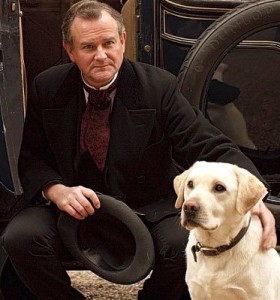 Anglophile that I am, I loved the first episode of this season’s Downton Abbey series on PBS. Lady Barbara and I were late comers, missing the first year. Upon realizing our mistake, we rented that year’s episodes on DVDs and did binge viewing of them, staying up some nights to 1 a.m.
Anglophile that I am, I loved the first episode of this season’s Downton Abbey series on PBS. Lady Barbara and I were late comers, missing the first year. Upon realizing our mistake, we rented that year’s episodes on DVDs and did binge viewing of them, staying up some nights to 1 a.m.
I have always insisted that we Americans are British, like it or not. That statement sticks in the craw of certain friends, the Irish ones in particular. When challenged, I confidently point to our language, our laws (we adopted the English Common Law), our whole legal system (e.g., Equity and the Rules of Evidence), our manners (before they disappeared in the Sixties), and our dress (before tweed gave way to the denim). The fact is that our Founding Fathers were transplanted Englishmen with hifalutin ideas about free speech, freedom of religion, and God-given rights.
The seeds of my Anglophilia were planted by my older brother Tom, seven years my senior. The first on our block to go to college, his library at home was filled with the works of Shakespeare, Shaw, Joyce, Maugham, and Greene. British films were his delight. How well I remember watching late night TV movies like “The Lavender Hill Mob,” “Captain’s Paradise,” “The Man in the White Suit” — all starring the late Alec Guinness. Oh, and then there was the 33 1/3 recording of Sir Lawrence Olivier’s lines in the first film version of Hamlet. “To be or not to be….” I actually memorized that soliloquy.
All that said, I must confess that on occasion my face-to face experiences with our cousins across the Atlantic have tested my inflated ideas about them. Not so long ago Lady Barbara and I flew to London to visit our son, Dan, who was studying law there and interning with a barrister who occupied the chambers that once housed Charles Dickens.
Our barrister friend was kind enough to arrange a visit with a British judge in London, and quite an experience it turned out to be. His Honor opened our visit by dressing down our barrister friend (with whom he had once practiced) for the inconvenient timing of our prearranged visit and, more importantly, for the “mistake” of taking us to lunch at the Navy Club overlooking the Thames, where he claimed they only served mutton. (They didn’t). Then he turned his attention to us, informing us that he was trying a contract case involving businessmen of Indian descent. “These Indians all lie,” he informed us, his gin-bloated, red-veined face frowning with disdain.
We then got to watch our jurist conduct the trial, and of course we were not surprised when he turned out to be a courtroom tyrant. When we mentioned our thought to barristers out in the hall, they informed us that the judge was on his best behavior because of our presence.
I cannot say that our British judge was particularly rude to Dan and me, but I was embarrassed for our barrister friend, and indeed he was humiliated by his former associate in the law. He had been a scholarship student at Cambridge (meaning he was not Upper Class), and he wondered aloud to me whether he was trying too hard to fit into their class system. It happened that I had just read a newspaper article in a London paper about the judicial selections in England; they are always, it seems, Oxbridge boys—Oxford or Cambridge, the traditional educators of Britain’s elite.
The best I could offer the fine young lawyer was a joke from Groucho Marx: Any club that would want me as a member I would not want to belong to. A few other choice expressions he might use occurred, but I did not express them.
To be sure, the typical person I met in England—riding the double deckers, traveling in the train to and from Cambridge, touring the city, riding in taxis—was friendly and helpful. Once as we stood on a street corner looking helplessly at a map, a well-dressed gentleman stopped to ask if he could help. That was not uncommon.
(Perversely, though, despite being an Anglophile, when haughty Brits like our judge friend irk me, I recall one of my favorite songs, The Battle of New Orleans, celebrating Andy Jackson’s victory over the British Redcoats in 1814:
We fired once more and they began a runnin’
Down the Mississippi to the Gulf of Mexico).
Once thing I could not help but notice was an underlying resentment about the remaining class differences among the English. A bus tour guide, a former Army major, opined as we passed Buckingham Palace that maintaining a nobility in a modern democracy is an absurdity. A cab driver took a gratuitous dig at the corruption of the upper classes.
And then there was the recent media report about a woman from the London cocktail set who said of the Osama bin Laden killing, “Oh those Americans and their guns…” I have to believe that she was very young, not able to recall that American guns and blood saved England’s bacon when Hitler was attempting to grind them into knockwurst.
Again, all that said, I still insist that I am proud of our nation’s English heritage, and I love seeing in Downton Abbey how World War I started the breakdown of the class system, how Lord Grantham’s inborn sense of class privilege wars with his natural kindness and sense of fairness, and how the English Common Man comes to realize and insist on recognition of his full equality.
When I am too tempted to sneer at British pretensions, I recall the sometimes tainted history of the finest nation on earth—our beloved United States of America. We may be the word’s last great hope, but like all humans we Americans do not always live up to our ideals.
So I continue my conflicted loyalty to our British roots. I read somewhere that Mahatma Gandhi thanked the British for their legal system, while he strove mightily (and peacefully) to free his nation from the English yoke. Even Gandhi was divided inside himself about the British.
Anyway, I look forward to many entertaining Sunday nights as the Crawley family struggles to cope with a new era and save Downton Abbey.
By the way, when I get out of line on my estate, I am referred to as Lord Grantham by Her Ladyship. Far from being offended, I take that as a compliment. The man knows how to live the good life. Did you see his fine yellow Lab and those delightful hunting cockers running with the horses? Now that’s living.
This post was originally published on Jan. 9, 2013.


I’m also very fascinated and sometimes bemused by our cousins across the pond. We are so much alike, which only emphasizes how different we are.
My wife had the good fortune to visit England and Scotland when she was young with her church choir. Visiting is at the top of our bucket list.
Thank you. That was a fine blog post.